
 Details and arcticles of the constant selling of influence and other nefarious activities by House Majority Leader Tom Delay (Rep.-Texas)
Be sure to visit our cavernous vault of archives.
Also, feel free to visit our sister site, Dick Cheney-Corporate Criminal.
Details and arcticles of the constant selling of influence and other nefarious activities by House Majority Leader Tom Delay (Rep.-Texas)
Be sure to visit our cavernous vault of archives.
Also, feel free to visit our sister site, Dick Cheney-Corporate Criminal.
Front page 07/01/2002 - 08/01/2002 11/01/2002 - 12/01/2002 02/01/2003 - 03/01/2003 03/01/2003 - 04/01/2003 05/01/2003 - 06/01/2003 06/01/2003 - 07/01/2003 07/01/2003 - 08/01/2003 08/01/2003 - 09/01/2003 09/01/2003 - 10/01/2003 10/01/2003 - 11/01/2003 11/01/2003 - 12/01/2003 12/01/2003 - 01/01/2004 01/01/2004 - 02/01/2004 02/01/2004 - 03/01/2004 03/01/2004 - 04/01/2004 04/01/2004 - 05/01/2004 05/01/2004 - 06/01/2004 06/01/2004 - 07/01/2004 07/01/2004 - 08/01/2004 08/01/2004 - 09/01/2004 09/01/2004 - 10/01/2004 10/01/2004 - 11/01/2004 11/01/2004 - 12/01/2004 12/01/2004 - 01/01/2005 01/01/2005 - 02/01/2005 02/01/2005 - 03/01/2005 03/01/2005 - 04/01/2005 04/01/2005 - 05/01/2005 05/01/2005 - 06/01/2005 06/01/2005 - 07/01/2005 07/01/2005 - 08/01/2005 08/01/2005 - 09/01/2005 09/01/2005 - 10/01/2005 10/01/2005 - 11/01/2005 11/01/2005 - 12/01/2005 12/01/2005 - 01/01/2006 01/01/2006 - 02/01/2006 02/01/2006 - 03/01/2006 03/01/2006 - 04/01/2006 04/01/2006 - 05/01/2006 05/01/2006 - 06/01/2006 06/01/2006 - 07/01/2006 07/01/2006 - 08/01/2006 08/01/2006 - 09/01/2006 09/01/2006 - 10/01/2006 10/01/2006 - 11/01/2006 11/01/2006 - 12/01/2006 12/01/2006 - 01/01/2007

Alexander gave $5,000 to Delay campaign before Texan indicted
By MIKE MADDEN
Tennessean Washington Bureau
WASHINGTON — Sen. Lamar Alexander gave money to embattled former House Majority Leader Tom DeLay's re-election campaign just before DeLay was indicted on conspiracy charges, federal records show.

Through his political action committee, Tenn PAC, Alexander gave $5,000 to DeLay, the powerful Texas Republican who was indicted last month on charges he conspired to flout laws in his home state barring corporate contributions to campaigns there.
A review of Federal Election Commission records by The Tennessean found that the Tennessee Republican was the only senator to give money to DeLay's re-election account, formally called the Tom DeLay Campaign Committee.
Alexander personally delivered the check to DeLay less than two weeks before a Texas grand jury returned charges against DeLay, forcing his resignation as majority leader and handing political ammunition to Democrats who are trying to build a broad corruption case against the GOP.
Alexander said Thursday that he didn't regret the donation. "I made a logical contribution, which was to the House majority leader," he said.
DeLay asked Alexander during an unrelated meeting in September whether the Texan should come to Tennessee to try to raise money for next year's election, said Nashville investor Ted Welch, a GOP fundraiser who runs Tenn PAC. Alexander offered to write him a check, Welch said.
"DeLay did not ask Lamar for the money, Lamar volunteered," Welch said. "Lamar said, 'Well, I'll just give you some money.' "
Dates on federal records filed by DeLay show that Alexander's contribution was received after DeLay was indicted, though Welch faxed The Tennessean a computer printout of Tenn PAC's financial activity that lists a donation to DeLay on Sept. 14. DeLay's campaign-finance report shows the Tenn PAC contribution came on Sept. 30 — two days after DeLay's indictment.
Former Federal Election Commission general counsel Larry Noble, now executive director of the nonpartisan Center for Responsive Politics, said campaigns legally are supposed to record contributions on the day they receive them, but often fall a few days behind. That could account for the different dates.
DeLay's campaign treasurer did not return calls inquiring about the donation.
Alexander said he uses Tenn PAC to support GOP candidates around the country and DeLay was just one of 30 he had given money to this year. His midyear report to the FEC lists contributions to 11 candidates, for a total of $55,000, as well as a $15,000 contribution to the National Republican Senatorial Committee.
"The PAC is for the purpose of making contributions to Republican candidates who are running for re-election," he said.
Asked if he would support DeLay again in the future, Alexander wouldn't answer directly.
"I've made my contribution," he said. "The contribution is made."
Democrats said Alexander shouldn't have given DeLay any money, even if it was before the indictment. Rumors that the Texan would be charged were buzzing around Washington for most of September.
"I think it's really troubling that he would send him money," said Tennessee Democratic Party Chairman Bob Tuke. "That sounds to me like a tacit endorsement of DeLay and DeLay's operation that he had been running."
The contribution surprised some analysts and political strategists, because Alexander doesn't share DeLay's reputation for hardball, deeply conservative politics.
"Isn't that funny?" said Vanderbilt University political science professor Bruce Oppenheimer. "That's a strange one, huh?"
DeLay is accused of taking contributions from corporate PACs into his own fundraising apparatus, then sending checks out to support GOP candidates for the Texas legislature in an attempt to get around the state's ban on corporate cash. House Republicans have rallied behind him, calling the indictment by a Democratic prosecutor politically motivated, but rules required him to resign his leadership post, and it is not clear whether he'll regain it.
Several House members, mostly Texas Republicans, have also given money to DeLay this year.
If DeLay had discussed fundraising with Alexander after his indictment, Tenn PAC might not have sent him any money, Welch said.
"But the fact was, when we wrote the check and when it was given to DeLay, he had not been indicted," he said.
DeLay did not give money to Alexander's campaign in 2002, nor has he sent money toward a possible re-election race in 2008. But Oppenheimer said Alexander might have given to DeLay because fundraisers often use contributions as a way to build up chits for the future, and he doubted voters would remember the issue in three years.
"You contribute when I ask for money, I'll contribute when you ask for money," he said. "It's not what I would have advised, but who
knows?"
(0) comments
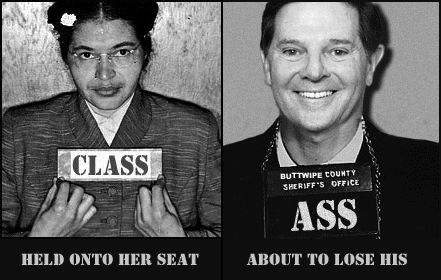
DeLay Acknowledges Failure to Report Money
WASHINGTON, Oct. 26, 2005
(AP) Rep. Tom DeLay has notified House officials that he failed to disclose all contributions to his legal defense fund as required by congressional rules.
The fund is currently paying DeLay's legal bills in a campaign finance investigation in Texas, where DeLay has been indicted, and in a federal investigation of Washington lobbyist Jack Abramoff. The lobbyist arranged foreign travel for DeLay and had his clients pay some of the cost.
DeLay, R-Texas, has denied wrongdoing in both cases.
DeLay wrote House officials that he started an audit and it found that $20,850 contributed in 2000 and 2001 to the defense fund was not reported anywhere.
An additional $17,300 was included in the defense fund's quarterly report but not in DeLay's 2000 annual financial disclosure report _ a separate requirement. Other donations were understated as totaling $2,800 when the figure should have been $4,450.
House rules require quarterly reports of donations and expenditures by a lawmaker's legal defense fund. Donations exceeding $250 also must be disclosed on annual financial disclosure reports.
The Texas Republican, who has stepped down as majority leader due to felony indictments in the Texas probe, disclosed and corrected the past reporting mistakes.
The defense fund will report to the House in a few days that it received $318,000 in the third quarter of this year _ the best fundraising quarter since it was started in June 2000, according to the trustee, Houston attorney Brent Perry.
On Oct. 13 DeLay wrote the clerk of the House, Jeff Trandahl, that the first inkling of inconsistencies in his disclosures came last February.
"I brought this matter _ which I discovered on my own _ to the attention of the Committee on Standards of Official Conduct to alert the chairman and ranking member," DeLay said in his letter.
"Upon learning of these accounting irregularities, I immediately requested that the trust undergo a full and complete audit from its June 2000 inception through 2004 to determine if any additional accountancy problems existed with the trust."
Perry, trustee of the Tom DeLay Legal Expense Trust, corrected the record in an Oct. 6 letter to the House ethics committee.
"I sincerely apologize for the oversights that made these amendments necessary," Perry wrote. "Congressman DeLay was not involved in these omissions. No mistakes were found after 2001."
In an interview, Perry said, "It was not an ethical lapse, it was a bookkeeping lapse. I did not review the reports thoroughly enough. The reports were filed under his signature but he relies on me for the reports."
In the third-quarter report that soon will be submitted to the House, Perry said $177,000 was donated by individuals in the quarter and an additional $141,000 by political committees, corporations and other entities.
In past years, the fund has paid legal bills in several ethics investigations of DeLay and in a racketeering suit filed by a House Democratic campaign organization. DeLay was admonished by the ethics panel on three occasions last year and the racketeering suit was closed in 2001.
Perry said $250,000 has been paid to lawyers so far in the Texas investigation, but he did not have a total for the Abramoff probe.
DeLay is charged in Texas with money laundering and conspiracy to violate Texas election laws.
Two grand juries have charged that DeLay and two political associates funneled corporate money to Texas legislative candidates _ using the national Republican Party as a middleman _ in violation of a a state law prohibiting use of corporate funds in state campaigns.
House Republican rules require leaders indicted on felony counts to step aside from their leadership posts.
(0) comments

Wal-Mart -- Morally and Politically Corrupt
Last week, Republican Congressman, and former Majority Leader of the U.S. House of Representatives, Tom DeLay was arrested and booked on state conspiracy and money-laundering charges.
As if corruption at the highest level of our government isn’t bad enough, it turns out Wal-Mart actually gave Tom Delay money 2 days after he was indicted. That’s right. Wal-Mart made a $5,000 contribution to support Tom Delay’s corruption 2 days after his indictment.
For a long time, we have known Wal-Mart’s policies are morally corrupt, but now we know Wal-Mart’s politics are politically corrupt too. But, this time, we are going to do something about it. Wal-Mart should ask Tom Delay for its contribution to be returned immediately.
Sign the online petition calling on Wal-Mart CEO Lee Scott to insist Tom Delay return Wal-Mart’s politically corrupt contribution today.
http://www.wakeupwalmart.com/feature/delay/
Wal-Mart has recently become a key player in "pay-to-play" politics. Wal-Mart’s corporate PAC donated more than $2.7 million to federal and state candidates in 2004, with nearly 80% of Wal-Mart’s campaign contributions going to Republican candidates.
Wal-Mart's radical right wing agenda hurts America. Only a corrupt, right-wing politician like Tom Delay could support Wal-Mart’s political agenda of poverty-level wages, poor health care, weaker child labor protections and an acceleration of shipping good-paying U.S. jobs overseas.
Don’t let Wal-Mart’s morally corrupt political agenda corrupt our Congress. Tell Wal-Mart to stop supporting corrupt politicians like Tom Delay today.
http://www.wakeupwalmart.com/feature/delay/
Our country deserves better than morally corrupt companies like Wal-Mart supporting politically corrupt politicians like Tom Delay.
(0) comments
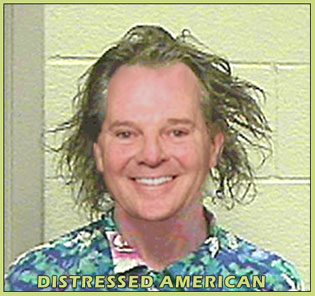
Tom DeLay and the Bridge to Nowhere
New York Times Editorial
Published: October 23, 2005
The situation in the House was torturous for Republicans last week as Representative Tom DeLay, their money-raising master and bare-knuckle champion, was arraigned on campaign fraud charges. Loyalists were caught between winking at Mr. DeLay's "temporary" resignation as majority leader and flinching at his resolve to maintain an iron hand on the agenda despite his coming trial.
Fellow Republicans are becoming edgy at the sight of Mr. DeLay still using his old leader's office, and working the floor on close votes. Mr. DeLay already has had to retreat before ultraconservative lawmakers who sense his weakness; he bowed to their demand for $50 billion in budget cuts across five years, with much of the pain focused on the neediest. Speaker Dennis Hastert had the chutzpah to blame the impotent Democratic minority for not finding "ways to keep our children from bearing the burden of a skyrocketing deficit." Much of the deficit, of course, is due to President Bush's binge of tax cuts for America's most affluent.
The intramural warfare sparked by Mr. DeLay's problems has spilled over to the supposedly calmer Senate. A point of open fury was reached last week as Tom Coburn, a freshman Republican senator from Oklahoma, argued that his colleagues could really show steel by sacrificing some of their treasured billions in pork projects, beginning with Alaska's notorious "bridge to nowhere."
Within minutes, Ted Stevens of Alaska, a grandee of pork, was apoplectic, warning he would quit public service if the bridges were killed. "I don't threaten people; I promise people," Senator Stevens, a Republican, growled.
The Republicans, of course, have a way out of all this posturing and growling. All they have to do is spike the $70 billion in additional upper-bracket tax cuts that President Bush has put on their agenda.
(0) comments

BREAKING: DeLay’s Lawyer Lies About MoveOn
Tom DeLay’s attorney, Dick DeGuerin, claims that the judge presiding over DeLay’s criminal case in Texas, Bob Perkins, should be disqualified. A central part of his claim is that an organization that Perkins has donated to in the past, MoveOn, is selling t-shirts with Tom DeLay’s mug shot:

DEGUERIN: The latest thing on MoveOn.org’s website, they are trying to raise money by selling t-shirts with Tom DeLay’s mug shot on the t-shirts. And I just don’t think that it looks right for the judge sitting on Congressman DeLay’s case to have contributed to an organization such as that.
According to MoveOn’s Washington director Tom Mattzie, this claim is false. Mattzie told ThinkProgress this morning that MoveOn has “never sold any t-shirts with Tom DeLay’s mug shot” on their website or otherwise. You can go to their website and see that he’s right.
Nevertheless, the media is already picking it up DeGuerin’s comments as if they were true. From the Associated Press:
The judge, Bob Perkins, has been a contributor to Democratic causes. DeLay’s attorney pointed out Friday that those causes include MoveOn.org, which is now selling a T-shirt with DeLay’s picture on it.
Dick DeGuerin wasn’t immediately available for comment. We’ll update you if he gets back to us.
UPDATE: DeGuerin made a similar false statement in the courtroom:
I noticed yesterday Moveon.org, to which you have contributed, was selling T-shirts with Mr. Delay’s mugshot on it to raise money.
(0) comments

Rep. Tom DeLay's mugshot, taken Thursday at the Harris County Sheriff's Office in Houston.
DeLay booked on conspiracy charges
Former House majority leader released on $10,000 bond
Updated: 2:52 p.m. ET Oct. 20, 2005
HOUSTON - Rep. Tom DeLay turned himself Thursday in at the Harris County sheriff’s bonding office, where he was photographed, fingerprinted and released on bond on state conspiracy and money laundering charges.
“He posted $10,000 bond and they have left the bonding office,” Lt. John Martin with the sheriff’s department said.
DeLay, accompanied by his attorney, Dick DeGuerin, showed up about 12:15 p.m., appeared before a judge and was gone in less than 30 minutes, Martin said.
The appearance came a day after a state court issued an arrest warrant for DeLay and set an initial bail, a routine step before the Texas Republican’s first court appearance Friday in Austin.
He had been expected to appear for booking in Bend County, but went to Houston instead. Under Texas law he could check in anywhere in the state.
Sheriff Milton Wright said late Thursday morning he knew of no timetable for the process. DeGuerin's office had said he was scheduled to be in Fort Bend County on Thursday. Delay, however, could legally check in anywhere in Texas.
DeLay has stepped down as U.S. House majority leader — at least temporarily — under a Republican rule requiring him to relinquish the post if charged with a felony.
Charged with funneling corporate donations
Two grand juries have charged DeLay and two political associates in an alleged scheme to violate state election law by funneling corporate donations to candidates for the Texas Legislature. State law prohibits use of corporate donations to finance state campaigns, although the money can be used for administrative expenses.
The indictments charge that a DeLay-founded Texas political committee sent corporate donations to the Republican National Committee in Washington, and the national party sent funds back to the state for 2002 campaigns.
DeLay has denied wrongdoing and accused Travis County District Attorney Ronnie Earle — a Democrat — of having partisan motives.
Earle has denied the accusation. Earle did not ask for the arrest warrant for DeLay but approved the court's request, his office said Wednesday.
“What we're trying to avoid is Ronnie Earle having him taken down in handcuffs, and fingerprinted and photographed,” DeGuerin said last month. “That's uncalled for, and I don't think that's going to happen.”
DeLay’s Republican fundraising in 2002 had major political consequences, allowing the GOP to take control of the Texas Legislature. The Legislature then redrew congressional boundaries according to a DeLay-inspired plan, took command of the state's U.S. House delegation and helped the GOP retain its House majority.
(0) comments

Arrest warrant issued for DeLay
Oct 19, 4:40 PM (ET)
HOUSTON (Reuters) - An arrest warrant was issued on Wednesday and bail set at $10,000 for former U.S. House Majority Leader Tom DeLay ahead of his scheduled court appearance this week in Austin, Texas for money laundering and conspiracy charges, a Texas court clerk said.
The so-called "capias" was a "purely procedural event" but would require DeLay to turn himself into authorities to be fingerprinted and photographed, Travis County Grand Jury Clerk Linda Estrada said.
Court officials said DeLay was expected to go to Fort Bend County jail in his district near Houston for booking, but that had not been confirmed.
"To any sheriff or peace officer of the state of Texas, greetings, you are hereby commanded to arrest Thomas Dale DeLay and keep him safely so that you have him before the 331st Judicial District Court of Travis County," the warrant said.
DeLay has been charged with conspiracy and money laundering in a campaign finance scheme tied to his political action committee, Texans for a Republican Majority.
He has denied any wrongdoing, but is accused of laundering $190,000 in corporate campaign contributions through the Republican National Committee for distribution to Republican candidates for the Texas Legislature in 2002.
Texas law forbids the use of corporate money in political campaigns.
He is scheduled to make his first court appearance on Friday before state District Judge Bob Perkins.
Neither a DeLay spokesman nor his lawyer was immediately available for comment.

DeLay will likely be booked this week
Associated Press
AUSTIN, Texas - Rep. Tom DeLay will likely be booked in a Texas county jail this week despite attempts by his attorneys to bypass the fingerprinting and mug shot process.
The former House majority leader was forced to step down from the post last month when he was indicted by a Texas grand jury. DeLay initially was charged with conspiracy to violate the election code and days later was indicted on charges of money laundering and conspiracy to launder money in an alleged illegal scheme to funnel corporate money to Republican Texas legislative candidates.
DeLay's arraignment is set for Friday before state district Judge Bob Perkins in Travis County, Texas.
"Perkins believes that if God was charged with a felony, he would have to go through the booking process, too," said D'Ann Underwood, court coordinator for the judge.
Before Friday, DeLay, a Republican from Sugar Land, Texas, will likely spend about an hour being fingerprinted and photographed, she said. He'll also be required to state his attorneys for the record.
Travis County allows some defendants to do a "walkthrough" booking process, in which the defendant is photographed and fingerprinted. But DeLay's bond amount would be preset so he could immediately pay it and avoid a stay in jail.
DeLay also could waive going before a magistrate to have his rights and charges read to him.
At Friday's court appearance, Perkins has the discretion to rule on motions to dismiss the charges, as requested by defense attorneys, but may elect to do so at a later date. The hearing will likely take less than 20 minutes, Underwood said.
(0) comments
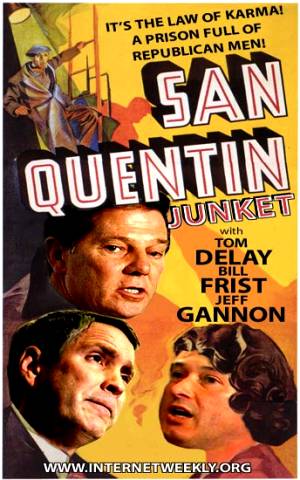
DeLay politics may carry heavy price
By Jim Drinkard, USA TODAY
Over lunch at the Sunset Grove Country Club in Orange, Texas, businessman Pete Cloeren lamented to Rep. Tom DeLay that he couldn't do more to help his friend Brian Babin get elected to Congress. Cloeren had personally given all he was allowed, and the law wouldn't let him donate money from his plastics company.

Tom Delay addresses his supporters at a United for Delay rally in Houston.
By Jessica Kourkounis, AP
DeLay had a solution, Cloeren said. "There are ways we get money moved around the system," Cloeren recalls him saying. "He told us at the lunch table that this was done all the time."
The day after the lunch in 1996, Cloeren says, a DeLay aide called with instructions to donate to several out-of-state political committees and candidates. After Cloeren did so, those committees directed like amounts to Babin's campaign.
Cloeren later pleaded guilty to campaign-finance violations, but the man he says advised him escaped any consequences. The Federal Election Commission dismissed Cloeren's complaint against DeLay for lack of evidence, and DeLay denied wrongdoing.
But the scenario Cloeren describes bears a striking similarity to transactions that have led to DeLay's indictment by two Texas grand juries in the past three weeks and his removal, at least temporarily, as House majority leader. One of the most effective House Republican leaders is sidelined as the chamber approaches crucial and difficult votes on spending cuts. DeLay is scheduled to make his first court appearance Friday in Austin.
"Based on the allegations, it seems that Tom DeLay has no problem with recommending the use of conduits to hide the source of money going to campaigns," said Larry Noble, director of the non-partisan Center for Responsive Politics, which studies money in politics. Noble was chief counsel to the FEC at the time of Cloeren's complaint about DeLay. "He seems to be somebody who likes playing in the gray areas, and occasionally stepping over the line."
DeLay maintains he has never done anything wrong and calls the charges "blatant political partisanship" by Travis County District Attorney Ronnie Earle, a Democrat. "I am innocent," he says. "Mr. Earle and his staff know it. And I will prove it."
DeLay's lawyer, Dick DeGuerin, charged Monday in a letter to Earle that the prosecutor had "tried to coerce a guilty plea" from his client to a misdemeanor, under the threat that if he didn't do it he would face a felony indictment.
From a base in suburban Houston, DeLay has raised money and used his power to redraw the Texas political map. The same aggressiveness that has landed him in legal trouble has given him an impressive list of friends in high places. His former protégé Dennis Hastert is speaker of the House of Representatives. Many House members owe their elections to his financial help. Former DeLay aides occupy powerful posts in and outside government — which helps explain why DeLay is so defiant in the face of trouble.
That trouble includes two indictments in Texas, for alleged money laundering and conspiracy, in connection with fundraising to help elect Republicans to the state Legislature. He also figures in the activities of Jack Abramoff and former DeLay aide Michael Scanlon, lobbyists under federal investigation for allegedly defrauding Indian tribes out of millions of dollars.
Lucrative networking
At his moment of legal and political peril, DeLay can count on a wide and influential network of allies — critics such as the group Common Cause call it "DeLay Inc." — sprinkled throughout Texas and, especially, the nation's capital.
Four of every five House Republicans have received campaign contributions from DeLay, and he has traveled across the country to raise millions more. DeLay's absence as the No. 2 House leader is being treated by his colleagues as temporary, until his legal situation is resolved.
His former aides are in powerful posts throughout Washington. Former chiefs of staff are prominent lobbyists, including Tim Berry, who just went to work for Time Warner. Other former aides represent top corporations — FedEx, Verizon, Microsoft, Pfizer, Motorola, Walt Disney, ChevronTexaco — and key trade groups.
The former aides multiply DeLay's clout by steering money from their wealthy clients to help DeLay and GOP causes. In 2002, former DeLay legislative director Drew Maloney, a lobbyist, rounded up $152,500 from energy corporations for DeLay's leadership PAC. The money bought entree to an exclusive golf outing at the Homestead resort in western Virginia, as Congress was putting the final touches on a major energy bill, according to records compiled for a House ethics investigation.
Lobbyist Richard Bornemann described the need to donate in a confidential memo to his client, the electric utility Western Resources (now Westar Energy): "The most beneficial way to spend corporate dollars — as opposed to cutting personal or PAC (political action committee) checks — is with the House leadership. That means joining the fold, so to speak, of House Majority Leader Tom DeLay." The memo was posted on the House ethics committee's website.
"DeLay knows that reciprocity is the strongest norm in Washington," said James Thurber of American University. "The clients know they have a relationship and that they have to come up with the money. It's very clear to them, and they do it."
"He is very good at keeping people as part of his extended family," said Stuart Roy, a former DeLay spokesman who is at the lobbying firm DCI Group. "It gives him additional reach and additional eyes and ears."
The reach of DeLay's influence was no accident. With GOP anti-tax activist Grover Norquist, he created the K Street Project, named after the downtown Washington corridor that is home to many lobbying firms. The project places Republicans in high-paying, high-powered lobbying jobs with access to top officials in the corporate and political worlds.
Since Republicans captured House control in 1994, the effort has remade the capital's lobbying culture — which had been tilted toward Democrats after decades of that party's domination of Congress — in a more Republican mold.
Fundraiser and concierge
To a degree matched by few politicians, DeLay saw fundraising as a tool to build and cement his support in Washington.
In the mid-'90s he was among the first to set up a separate fundraising committee, known as a leadership PAC, that allowed him to collect money to fund his political activities and give to fellow Republicans. The move allowed him to in effect collect twice from a long list of business interests. Eleven of the top 20 donors to his campaign committee and leadership PAC are the same, including the National Restaurant Association, Union Pacific, UPS, Fluor Corp. and the Realtors.
He also leaned on businesses to tilt their giving more to the GOP, keeping a list of how much various interests gave to each party. "He has sent a loud message to the people who raise and give political money that the Democrats are no longer in charge," said Vin Weber, a former Republican congressman from Minnesota.
DeLay also instituted a program to introduce his K Street friends to politically vulnerable Republicans. The politicians usually walk away from the "Retain our Majority Program" with an extra $100,000 for their campaigns.
In 2000, DeLay donated $150,000 from his leadership PAC to a similar committee set up in Missouri by Rep. Roy Blunt, whom he had just elevated to be his chief deputy. Blunt has followed DeLay up the leadership ladder and holds the majority leader title while his former boss deals with his legal problems.
DeLay spends money in other ways that solidify his network, including for the care and feeding of Republicans. Lobbyist Dan Mattoon recalled that at the Republican Convention in Houston in 1992, DeLay arranged for cars and drivers to ferry House members around the sprawling city.
"Tom understood what members' needs are," Mattoon said. "He found a way to make them more comfortable and willing to follow the leadership."
As the chief vote-counter in the House, he routinely set up buffets in his Capitol office during late-night legislative sessions, where Republicans could grab Chinese food, some barbecue or pizza. The gatherings made his office a center of social activity and an information depot.
For the convention in Philadelphia in 2000, DeLay took his concierge role to a new level, setting up a fenced-off camp of vintage rail cars loaned by Union Pacific and collecting money from corporate sponsors to lavish food and drinks on House Republicans — and the lobbyists who were picking up the tab. Corporate sponsors included Enron, UPS and the Mississippi Band of Choctaw Indians.
The Indian tribe's donation is evidence of yet another link in DeLay's network, and one that looms as a major problem: Lobbyists Abramoff and Scanlon are under federal investigation for their activities on behalf of tribes with gambling operations, including the Mississippi Choctaws, for which they billed the tribes $82 million.
DeLay took at least three trips with Abramoff — to play golf in Scotland, to Russia and to the Northern Mariana Islands. There is evidence that lobbyists or foreign interests picked up some or all of the travel costs, which would be a violation of House ethics rules.
DeLay's lasting mark on Washington — his hardball politics, envelope-pushing fundraising and building of Republican dominance — have come at a price, says Mike Johnson, a lobbyist and former GOP leadership aide in the House.
"What he has brought to the process is that Texas-sized bravado and hubris — that you do things bigger and better and faster than before to accomplish your mission," he said. "That attracts attention, but it also attracts gunfire."
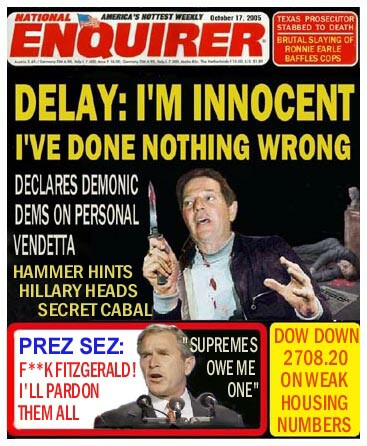
DeLay Nixed Misdemeanor Deal
WASHINGTON, Oct. 17, 2005
(AP) A Texas prosecutor offered Rep. Tom DeLay a deal to plead guilty to a misdemeanor and save his job as majority leader, but DeLay chose to fight felony charges instead, the congressman's attorney said Monday.
Dick DeGuerin, DeLay's lawyer, described the offer in a letter to the prosecutor as he filed motions in Austin to dismiss felony indictments and — barring dismissal of the case — to seek a speedy trial.
Travis County District Attorney Ronnie Earle had no immediate comment.
DeLay, R-Texas, has been indicted on conspiracy and money laundering charges in a Texas campaign finance investigation, both felonies. He was obligated to step aside — at least temporarily — under House Republican rules.
"Before the first indictment you tried to coerce a guilty plea from Tom DeLay for a misdemeanor, stating the alternative was indictment for a felony which would require his stepping down as majority leader of the United States House of Representatives," DeGuerin wrote Earle.
"He turned you down flat so you had him indicted, in spite of advice from others in your office that Tom DeLay had not committed any crime," the lawyer wrote.
DeLay and two political associates are accused of using corporate money to finance the campaigns of Texas Republican candidates for the state Legislature. Texas law prohibits corporate political donations in state political campaigns.
The charges allege that DeLay, two political associates and a Texas political action committee started by DeLay sent corporate money to the Republican National Committee in Washington — and that the RNC sent the funds back to Texas for the legislative candidates.
The donations helped Republicans win control of the Legislature in the 2002 elections and gain approval of a DeLay-inspired congressional redistricting plan that later helped the GOP retain control of the U.S. House.
In a series of filings prior to the Texas Republican's arraignment Friday in Austin, DeGuerin asked for:
A speedy trial, because the indictments "have already had adverse collateral consequences including the temporary loss of Tom DeLay's leadership position in the United States Congress and an unknown effect on the upcoming (March 2006) primary election."
Dismissal of the indictments because, he contended, they failed to allege any act or omission by DeLay and improperly joined two offenses.
Separation of DeLay's case from that of two political associates charged as co-conspirators, because DeLay wants a speedy trial while the associates are pursuing appeals that would delay their cases.
DeLay will likely be booked in a Texas county jail this week despite attempts by his attorneys to bypass the fingerprinting and mug shot process.
Steve Brittain, one of DeLay's Austin attorneys, also said the lawmaker has the option of turning himself in to Fort Bend County authorities, the county where DeLay resides.
(0) comments
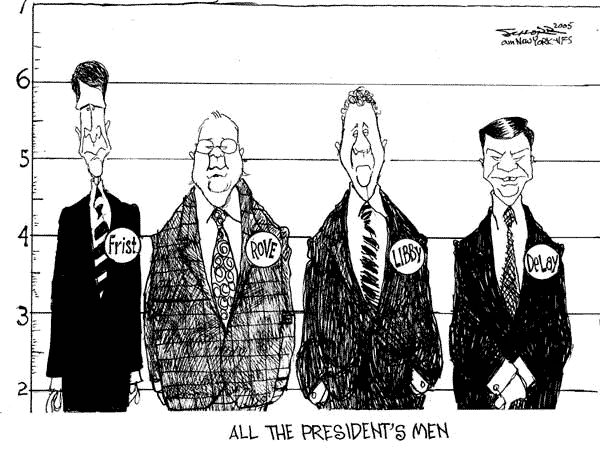
Florida GOP won't return money tied to DeLay fundraising
Eleven House Republicans from Florida who received cash from Tom DeLay's PAC said they will keep it.
BY FRANK DAVIES
Florida Republicans in the U.S. House steadfastly support Tom DeLay, their indicted leader, and have decided not to return substantial contributions they received from DeLay's political action committee.
While at least three Republicans from other states have returned such contributions or donated the money to hurricane relief, Reps. Clay Shaw of Fort Lauderdale, who received $30,000, Katherine Harris of Sarasota ($20,000) and nine other Florida Republicans say there is no reason to do that.
''Last time I checked, you're innocent until proven guilty,'' said Harris, who is running for the U.S. Senate. She labeled several calls to return money from DeLay's Americans for a Republican Majority (ARMPAC) as ``nothing but political grandstanding.''
Rep. Mario Díaz-Balart of Miami, who received $10,000 from ARMPAC, said he would return the money only if DeLay is convicted. And like many other Republicans, he blamed Delay's legal troubles on an ''out-of-control prosecutor,'' Ronnie Earle, who he said craves publicity and is out to get DeLay.
''He's the Paris Hilton of prosecutors -- and that's probably an insult to Paris Hilton,'' Díaz-Balart said.
DONATIONS TO DELAY
Díaz-Balart, Shaw and five other Florida Republicans also contributed to DeLay's legal defense fund.
Harris, Shaw and several other state Republicans said they had no problem with Delay continuing to play a prominent role as a House leader, even though he stepped down as majority leader when he was indicted Sept. 28 in Texas.
DeLay faces charges of conspiracy to violate campaign finance laws and, in a second indictment, money laundering.
The League of Conservation Voters urged Republicans to return ARMPAC money, focusing on Shaw, Harris and others who received large contributions and voted for what the group called an antienvironmental energy bill favored by DeLay.
''While this latest ethical cloud hangs over Congressman DeLay, the decent thing for them to do is return the money until this issue is resolved,'' said Deb Callahan, president of the League.
Three House Republicans are returning ARMPAC contributions: Jeb Bradley of New Hampshire ($15,000), Heather Wilson of New Mexico ($10,000) and Kenny Hulshof of Missouri, who said he would donate the $14,500 received from ARMPAC to Hurricane Katrina relief.
''The congresswoman just thought it was the right thing to do -- it was a black and white thing,'' said Jane Altweis, a spokesperson for Wilson.
And not all Republicans are comfortable with the active role DeLay continues to play in the House even though he officially stepped aside, at least temporarily, for Rep. Roy Blunt, R-Mo.
OTHERS NERVOUS
Rep. Ray LaHood, R-Ill., told The Hill newspaper that there's ''nervousness and anxiety'' among Republicans about the arrangement, and noted that former Republican leaders Newt Gingrich and Bob Livingston, and Democrat Jim Wright stepped aside for the good of their parties when ethical questions arose.
James Thurber, who directs the Center for Congressional and Presidential Studies at American University, said that as the 2006 congressional election gets closer, ``DeLay could be radioactive.''
''There's a danger in getting too close to DeLay and DeLay's money, but it's too early to know how much danger there is,'' he said.
Thurber said that DeLay had established ''a very effective money machine,'' attracting a steady flow of corporate and lobbyists' donations and then dispensing money to House candidates in competitive races.
Both parties do that through leadership political action committees, but ARMPAC set the standard, dispensing $4.2 million since 1994 to GOP candidates, according to the Center for Responsive Politics, which tracks contributions.
Shaw and other Republicans point out that ARMPAC is not part of the two indictments against DeLay, which focus on another political action committee, Texans for a Republican Majority. And they complain that Democrats and MoveOn.org, a liberal activist group urging members to pressure Republicans on the issue, are just playing politics.
''These groups are trying to link [the indictments] to the other PAC, and they're not related,'' said Shaw, who praised Delay's leadership.
Rep. Tom Feeney, a Republican from Central Florida, said ``the call to return the money is simply an organized effort by partisan advocacy groups hoping to maximize the impact of a politically driven attack.''
Díaz-Balart noted that MoveOn.org has received financial support from a ''convicted felon,'' George Soros, convicted of insider trading in France.
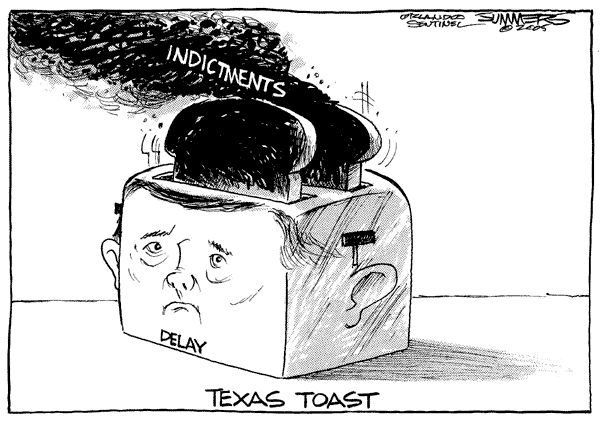
DeLay lawyer aims to tarnish prosecutor
WASHINGTON -- Former House Majority Leader Tom DeLay's legal team asked a court Friday to throw out his indictment, arguing that a Texas district attorney ''attempted to browbeat and coerce'' grand jurors into filing criminal charges.
Prosecutor Ronnie Earle ''and his staff engaged in ... [a] desperate attempt to contrive a viable charge and get a substitute indictment of Tom Delay,'' DeLay's attorney said in a court filing alleging prosecutorial misconduct.
Earle said the claims have no merit. AP
(0) comments
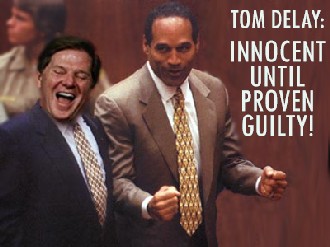
DeLay Campaign Accepted Illegal Corporate Contributions
Another Tom DeLay PAC has accepted money from “tainted sources.”
The FEC has ordered the Tom DeLay Congressional Committee to disgorge itself of $2400 donated by Westar Energy and its employees.
Why? Westar “improperly facilitated” the contributions. The contributions came from 6 Westar employees, but Westar was so involved in ordering/facilitating those contributions that the FEC considered it to be a single $2400 corporate contribution. Federal law bars political campaigns from directly accepting corporate money. (Note that two of the contributions came from Westar’s top executives at the time, David Wittig and Douglas Lake, who were recently convicted of looting $37 million from the company.)
DeLay’s relationship with Westar isn’t new. In 2004, the House Ethics Committee rebuked DeLay for an appearance at a Westar fundraiser and for creating the appearance that a donation to his PAC would result in “special treatment or special access to the member.”
Westar Energy was also indicted in 2004 for contributing $25,000 to DeLay’s TRMPAC, which was then sent along to the Republican National Committee as part of a $190,000 check. Allegedly, a list of candidates’ names and amounts they should receive accompanied that check, leading to charges that Westar Energy donated corporate money to political candidates.
Another day, another example of illegal corporate influence on the former House Majority Leader.
(0) comments
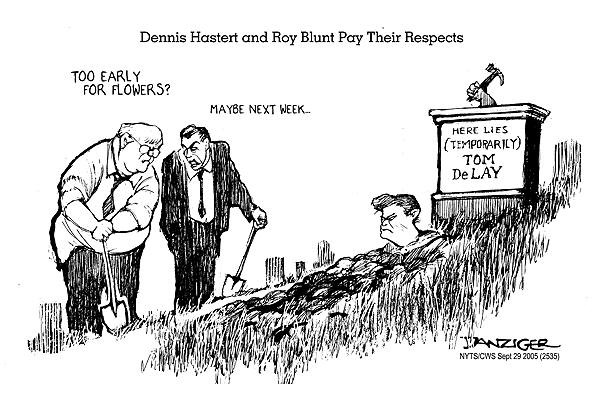
DeLay, House successor swapped donations
AP campaign document review shows transactions took circuitous routes
The Associated Press
Updated: 11:49 p.m. ET Oct. 5, 2005
WASHINGTON - Tom DeLay deliberately raised more money than he needed to throw parties at the 2000 presidential convention, then diverted some of the excess to longtime ally Roy Blunt — now occupying DeLay's former post as House Majority Leader — through a series of donations that benefited both men’s causes.
When the financial carousel stopped, DeLay’s private charity, the consulting firm that employed DeLay’s wife and the Missouri campaign of Blunt’s son all ended up with money, according to campaign documents reviewed by The Associated Press.
Jack Abramoff, a Washington lobbyist recently charged in an ongoing federal corruption and fraud investigation, and Jim Ellis, the DeLay fundraiser indicted with his boss last week in Texas, also came into the picture.
The complicated transactions are drawing scrutiny in legal and political circles after a grand jury indicted DeLay on charges of violating Texas law with a scheme to launder illegal corporate donations to state candidates.
A taste for middlemen
The government’s former chief election enforcement lawyer said the Blunt and DeLay transactions are similar to the Texas case and raise questions that should be investigated regarding whether donors were deceived or the true destination of their money was concealed.
“These people clearly like using middlemen for their transactions,” said Lawrence Noble. “It seems to be a pattern with DeLay funneling money to different groups, at least to obscure, if not cover, the original source,” said Noble, who was the Federal Election Commission’s chief lawyer for 13 years, including in 2000 when the transactions occurred.

None of the hundreds of thousands of dollars in donations DeLay collected for the 2000 convention were ever disclosed to federal regulators because the type of group DeLay used wasn’t governed by federal law at the time.
DeLay has temporarily stepped aside as majority leader after being indicted by a Texas prosecutor. Blunt — who had been majority whip, the No. 3 Republican in the House — has taken over much of that role in DeLay’s absence.
Spokesmen for the two Republican leaders say they disclosed what was required by law at the time and believe all their transactions were legal, though donors might not always have know where their money was headed.
“It illustrates what others have said, that money gets transferred all the time. This was disclosed to the extent required to be disclosed by applicable law,” said Don McGahn, a lawyer for DeLay. “It just shows that donors don’t control funds once they’re given.”
Blunt and DeLay planned all along to raise more money than was needed for the convention parties and then route some of that to other causes, such as supporting state candidates, said longtime Blunt aide Gregg Hartley.
“We put together a budget for what we thought we would raise and spend on the convention and whatever was left over we were going to use to support candidates,” said Hartley, Blunt’s former chief of staff who answered AP’s questions on behalf of Blunt.
Hartley said he saw no similarity to the Texas case. The fact that DeLay’s charity, Christine DeLay’s consulting firm and Blunt’s son were beneficiaries was a coincidence, Hartley said.
Much of the money — including one donation to Blunt from an Abramoff client accused of running a “sweatshop” garment factory in the Northern Mariana Islands — changed hands in the spring of 2000, a period of keen interest to federal prosecutors.
Golf trip
During that same time, Abramoff arranged for DeLay to use a concert skybox for donors and to take a golfing trip to Scotland and England that was partly underwritten by some of the lobbyist’s clients. Prosecutors are investigating whether the source of some of the money was disguised, and whether some of DeLay’s expenses were originally put on the lobbyist’s credit card in violation of House rules.
Both DeLay and Blunt and their aides also met with Abramoff’s lobbying team several times in 2000 and 2001 on the Marianas issues, according to law firm billing records obtained by AP under an open records request. DeLay was instrumental in blocking legislation opposed by some of Abramoff’s clients.
Noble said investigators should examine whether the pattern of disguising the original source of money might have been an effort to hide the leaders’ simultaneous financial and legislative dealings with Abramoff and his clients.
“You see Abramoff involved and see the meetings that were held and one gets the sense Abramoff is helping this along in order to get access and push his clients’ interest,” he said. “And at the same time, you see Delay and Blunt trying to hide the root of their funding.
“All of these transactions may have strings attached to them. ... I think you would want to look, if you aren’t already looking, at the question of a quid pro quo,” Noble said.
Blunt and DeLay have long been political allies. The 2000 transactions occurred as President Bush was marching toward his first election to the White House, DeLay was positioning himself to be House majority leader and Blunt was lining up to succeed DeLay as majority whip, the third-ranking position in the House.
Little scrutiny
The entities Blunt and DeLay formed allowed them to collect donations of any size and any U.S. source with little chance of federal scrutiny.
DeLay’s convention fundraising arm, part of his Americans for a Republican Majority Political Action Committee (ARMPAC), collected large corporate donations to help wine and dine Republican VIPs during the presidential nominating convention in Philadelphia in late summer 2000. DeLay’s group has declined to identify any of the donors.
Blunt’s group, a nonfederal wing of his Rely on Your Beliefs Fund, eventually registered its activities in Missouri but paid a $3,000 fine for improperly concealing its fundraising in 1999 and spring 2000, according to Missouri Ethics Commission records.
Both groups — DeLay’s and Blunt’s — were simultaneously paying Ellis, the longtime DeLay fundraiser who was indicted along with his boss in Texas in the alleged money laundering scheme.
The DeLay group began transferring money to Blunt’s group in two checks totaling $150,000 in the spring of 2000, well before Republicans actually met in Philadelphia for the convention. The transfers accounted for most of money Blunt’s group received during that period.
DeLay’s convention arm sent $50,000 on March 31, 2000. Eight days later, the Blunt group made a $10,000 donation to DeLay’s private charity for children on April 7, 2000, and began the first of several payments totaling $40,000 to a northern Virginia-based political consulting firm formed by DeLay’s former chief of staff, Ed Buckham.
That consulting firm at the time also employed DeLay’s wife, Christine, according to DeLay’s ethics disclosure report to Congress.
Hartley said Blunt was unaware that Mrs. DeLay worked at the firm when he made the payments, and that she had nothing to do with Blunt’s group.
On April 14, 2000, Concorde Garment Manufacturing, based in the Northern Marianas Islands that was part of Abramoff’s lobbying coalition, contributed $3,000 to Blunt’s group.
Hartley said the donation was delivered during a weekend of fundraising activities by Blunt and DeLay but his boss did not know who solicited it.
Concorde, derided for years in lawsuits as a Pacific island sweatshop, paid a $9 million penalty to the U.S. government in the 1990s for failing to pay workers’ overtime. The company was visited by DeLay.
The company was a key member of the Marianas garment industry that the islands’ government was trying to protect when it hired Abramoff to lobby DeLay, Blunt and others to keep Congress from imposing tougher wage and tax standards on the islands.
‘Unrelated activities’
After the November 2000 election, Abramoff’s firm billed its Mariana Islands clients for at least one meeting with Blunt and three meetings with Blunt’s staff, billing records show. Abramoff’s team also reported several meetings with DeLay and his staff on the issue, including one during the presidential convention.
On May 24, 2000 — just before DeLay left with Abramoff for the Scottish golfing trip — DeLay’s convention fundraising group transferred $100,000 more to Blunt’s group. Within three weeks, Blunt turned around and donated the same amount to the Missouri Republican Party.
The next month, the state GOP began spending large amounts of money to help Blunt’s son, Matt, in his successful campaign to become Missouri secretary of state. On July 25, 2000, the state GOP made its first expenditure for the younger Blunt, totaling just over $11,000. By election day, that figure had grown to more than $160,000.
Hartley said Blunt always liked to help the state party and the fact that his son got party help after his donation was a coincidence. “They are unrelated activities,” he said.
Exchanges of donations occurred again in the fall. Just a few days before the November election, DeLay’s ARMPAC gave $50,000 to the Missouri GOP. A month later, the Missouri GOP sent $50,000 to DeLay’s group.
© 2005 The Associated Press. All rights reserved. This material may not be published, broadcast, rewritten or redistributed.
(0) comments
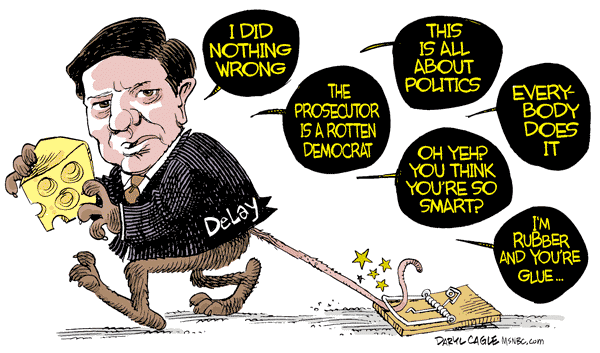
Tom DeLay's House of Shame
Congress has always had its share of extremists. But the DeLay era is the first time the fringe has ever been in charge.
By Jonathan Alter
Newsweek
Oct. 10, 2005 issue - A decade ago, I paid a call on Tom DeLay in his ornate office in the Capitol. I had heard a rumor about him that I figured could not possibly be true. The rumor was that after the GOP took control of the House that year, DeLay had begun keeping a little black book with the names of Washington lobbyists who wanted to come see him. If the lobbyists were not Republicans and contributors to his power base, they didn't get into "the people's House." DeLay not only confirmed the story, he showed me the book. His time was limited, DeLay explained with a genial smile. Why should he open his door to people who were not on the team?
Thus began what historians will regard as the single most corrupt decade in the long and colorful history of the House of Representatives. Come on, you say. How about all those years when congressmen accepted cash in the House chamber and then staggered onto the floor drunk? Yes, special interests have bought off members of Congress at least since Daniel Webster took his seat while on the payroll of a bank. And yes, Congress over the years has seen dozens of sex scandals and dozens of members brought low by financial improprieties. But never before has the leadership of the House been hijacked by a small band of extremists bent on building a ruthless shakedown machine, lining the pockets of their richest constituents and rolling back popular protections for ordinary people. These folks borrow like banana republics and spend like Tip O'Neill on speed.
I have no idea if DeLay has technically broken the law. What interests me is how this moderate, evenly divided nation came to be ruled on at least one side of Capitol Hill by a zealot. This is a man who calls the Environmental Protection Agency "the Gestapo of government" and favors repealing the Clean Air Act because "it's never been proven that air toxins are hazardous to people"; who insists repeatedly that judges on the other side of issues "need to be intimidated" and rejects the idea of a separation of church and state; who claims there are no parents trying to raise families on the minimum wage—that "fortunately, such families do not exist" (at least Newt Gingrich was intrigued by the challenges of poverty); who once said: "A woman can't take care of the family. It takes a man to provide structure." I could go on all day. Congress has always had its share of extremists. But the DeLay era is the first time the fringe has ever been in charge.
The only comparison to DeLay Co. might be the Radical Republicans of the 1860s. But the 19th-century Radical Republican agenda was to integrate and remake the South. The 21st-century Radical Republican agenda is to enact the wish list of the tobacco and gun lobbies, repeal health and safety regulations and spend billions on shameless pork-barrel projects to keep the GOP at the trough. Another analogy is to Republican Speaker Joe Cannon, who ran the House with an iron fist a century ago. But Cannon had to contend with Progressive Republicans who eventually stripped him of his power. DeLay's ruling radical conservative claque remains united, at least for now.
Comparisons with fellow Texan Sam Rayburn fall short, too. Rayburn was respected on both sides of the aisle for his rock-solid integrity. He and most other House speakers carefully balanced their support for corporate interests like the oil depletion allowance with at least some sense of the public good. And they had to share much of their power with committee chairmen. Today, seniority is much less important. Chairmen are term-limited (six years) or tossed if they displease DeLay. And this crowd views "the public interest" as strictly for liberal pantywaists.
How have they succeeded? A new book, "Off Center: The Republican Revolution and the Erosion of American Democracy," by Jacob S. Hacker and Paul Pierson, explains how the GOP is simply better than the Democratic Party at the basic blocking and tackling of politics, including the exploitation of cultural and religious issues. The authors argue that even if DeLay goes down, the zealotry and corporate shilling will continue as long as the GOP controls the House. Consider DeLay's temporary replacement, Missouri Rep. Roy Blunt. The Washington Post reported last week that Blunt is respected by Republican members in part because he has "strong ties to the Washington lobbying community." That's a qualification for office?
The only reason the House hasn't done even more damage is that the Senate often sands down the most noxious ideas, making the bills merely bad, not disastrous. What next for the House of Shame? If DeLay's acquitted, he'll be back in power. If he's convicted, his proteges will continue his work. Reform efforts by fiscal conservatives determined to curb their borrow-and-spend colleagues are probably doomed. The only way to get rid of the termites eating away the people's House is to stamp them out at the next election.
(0) comments
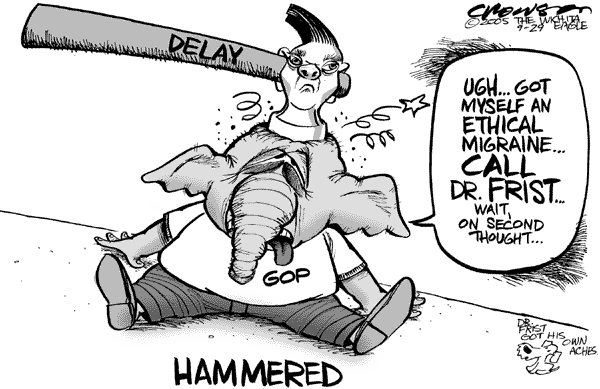
Grand Jury Re-Indicts DeLay on New ChargeGrand Jury Re-Indicts DeLay on New Money Laundering Charge on Heels of Conspiracy Charge

Representative Tom Delay, R-Tex., talks to reporters on Capitol Hill in this Wednesday, Sept. 28, 2005 file photo, after resigning as House Majority Leader following his indictment by a Texas grand jury on conspiracy charges. A Texas grand jury indicted DeLay on a new charge of money laundering Monday, less than a week after another grand jury leveled a conspiracy charge that forced DeLay to temporarily step down as House majority leader. (AP Photo/Dennis Cook, FILE)
By APRIL CASTRO Associated Press Writer
The Associated Press
AUSTIN, Texas Oct 3, 2005 — A Texas grand jury on Monday re-indicted Rep. Tom DeLay on charges of conspiring to launder money and money laundering after the former majority leader attacked last week's indictment on technical grounds.
The new indictment, handed up by a grand jury seated Monday, contains two counts: conspiring to launder money and money laundering. The latter charge carries a penalty of up to life in prison. Last week, DeLay was charged with conspiracy to violate campaign finance laws.
Defense lawyers asked a judge Monday to throw out the first indictment, arguing that the charge of conspiring to violate campaign finance laws was based on a statute that didn't take effect until 2003 a year after the alleged acts.
The new indictment from District Attorney Ronnie Earle, coming just hours after the new grand jurors were sworn in, outraged DeLay.
"Ronnie Earle has stooped to a new low with his brand of prosecutorial abuse," DeLay said in a statement. "He is trying to pull the legal equivalent of a 'do-over' since he knows very well that the charges he brought against me last week are totally manufactured and illegitimate. This is an abomination of justice."
DeLay and two political associates are accused of conspiring to get around a state ban on corporate campaign contributions by funneling the money through the DeLay-founded Texans for a Republican Majority Political Action Committee to the Republican National Committee in Washington. The RNC then sent back like amounts to distribute to Texas candidates in 2002, the indictment alleges.
DeLay's associates, John Colyandro of Austin and Jim Ellis of Washington, were each previously indicted on charges of conspiracy to violate campaign finance laws and money laundering.
The judge who will preside in DeLay's case is out of the country on vacation and couldn't rule on the defense motion. Other state district judges declined to rule on the motion in his place.
Associated Press writer Suzanne Gamboa in Washington and Kelley Shannon in Austin contributed to this report.
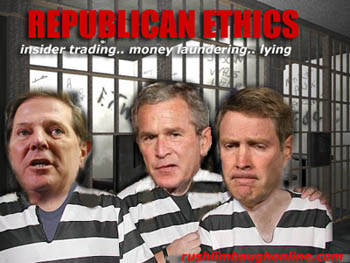
The Real Tom DeLay Story
by Allan Lichtman
The real story about Tom DeLay’s indictment in Texas goes far beyond the corrupt
acts of a single individual. DeLay’s intervention in Texas state legislative elections was
part of a concerted, nationwide Republican plan to control our government through
political gerrymandering at the expense of black and Hispanic voters. I observed this
process first hand as the expert witness for Democrats in the court cases challenging
Republican congressional redistricting plans not only in Texas, but also in Pennsylvania,
Florida, Ohio, and Michigan.
These latter four states are equally divided between Republicans and Democrats,
yet Republican gerrymandering has resulted in GOP control of about two-thirds of
their congressional seats.
By pumping money into state legislative races in Texas, DeLay engineered Republican
control in 2002 over a previously divided state legislature. He then guided Texas
lawmakers into breaking precedent by rewriting mid-decade an established congressional redistricting plan. The DeLay plan thwarted the will of voters by drawing districts to
guarantee Republican victories and take over five Democratic seats. To this end,
DeLay and his allies cynically and knowingly destroyed the voting rights of millions
of African-Americans and Hispanics in Texas.
In the Dallas County area, the plan demolished a 60.5 percent minority district and
scattered its voters into five Anglo-dominated, Republican districts in which they have
no chance to influence the outcomes of elections. In southwest Texas, DeLay’s plan
removed some 90,000 Hispanics from Congressional District 23 to ensure that it
would elect a Republican opposed by Hispanic voters. His plan dismantled seven other congressional districts across Texas in which African-American and Hispanic voters
critically influenced election outcomes, submerging these voters into heavily Republican
districts in which they have no influence.
The big corporate interests behind Tom DeLay knew full well what they bought in Texas.
They bought our government. Absent DeLay’s gerrymandering, the Democrats, not
Republicans, would have picked up congressional seats nationally in 2004, putting
Democrats in a much better position to regain control of Congress next year.
Allan Lichtman is a political historian at American University and a Democratic
candidate for US Senate from Maryland.
(0) comments

Grand jury foreman cites "stacks" of evidence against DeLay
The Dallas Morning News
By Christy Hoppe
AUSTIN, Texas — Grand jurors were presented a load of evidence, including testimony and phone records, that led them to believe Rep. Tom DeLay, R-Texas, should be tried on a conspiracy charge, the leader of the Travis County grand jury that indicted the congressman said yesterday.
"It was not one of those sugar-coated deals that we handed to [District Attorney] Ronnie Earle," William Gibson said.
He added: "Mr. Earle has stacks and stacks of papers — evidence of telephone calls from Mr. DeLay and everybody."
DeLay has said Earle has no evidence to prove that he tried to subvert state election laws. His lawyers did not return calls seeking comments on Gibson's description of the grand-jury proceedings.
The indictment stems from the activities of Texans for a Republican Majority, a political-action committee created by DeLay. The group, known as TRMPAC, is accused of trying to circumvent Texas laws that make it illegal to use corporate or union money in political campaigns.
Labeling it a money-laundering scheme, Earle claims TRMPAC took $190,000 in corporate donations and routed it — along with the names of seven statehouse candidates — to the Republican National Committee (RNC) in September 2002. The RNC then sent $190,000 in contributions to those same seven candidates, who couldn't legally have accepted corporate money.
At the heart of the conspiracy charge against DeLay is whether he knew about the transaction. Experts on Texas law say that knowledge alone might be all that is needed for a conviction under state law.
DeLay, who stepped down as House majority leader when the indictment was issued Wednesday, and his lawyers maintain he knew nothing about the money exchange at the time it happened and the indictment is a political vendetta against him.
But in the first public acknowledgments of what evidence against DeLay might exist, Gibson, 76, a former sheriff's deputy and state insurance investigator, said there were ample indications of the congressman's involvement.
He said DeLay provided the district attorney with a written statement that was given to the grand jury to consider but that DeLay declined to sign a sworn document or testify under oath. "[DeLay] just gave a statement saying he did nothing. And he didn't know how that money got back down here and all that stuff," Gibson said. "We believe different from other paperwork we got."
He added, "I am very much convinced that he had" knowledge of the transaction.
Earlier, DeLay attorney Dick DeGuerin disagreed his client knew about the transaction.
"He had knowledge of it after it happened," DeGuerin said after the Wednesday indictment. "It wasn't something that he did in advance, or suggested, or anything like that."
DeLay's legal team also questions the money-laundering charge, asserting that corporate money was legally accepted by the RNC and a different $190,000 — from a separate, noncorporate account — was distributed to state representative candidates.
Gibson, summing up the grand-jury decision, said yesterday, "As far as we're concerned, they presented us enough evidence and witnesses that we felt we were on the right track. I would not have put my name on that grand-jury indictment unless I felt we had ample probable cause."
While DeLay lieutenants John Colyandro and Jim Ellis were indicted for the alleged money-laundering maneuver, DeLay was charged only with conspiracy.
(0) comments